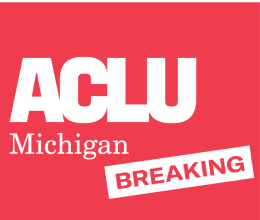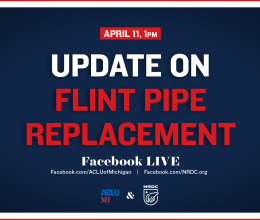Residents of Flint will finally get their lead pipes replaced as a result of a settlement agreement being considered by a federal judge today. If approved, the settlement will require the State of Michigan and City of Flint to replace Flint’s lead pipes within three years, and will be enforceable by the court. The lawsuit was filed in response to the Flint water crisis, the result of failed government decisions that caused lead to leach out from aging pipes into thousands of homes in Flint.
“We are thrilled that, after nearly three years of grappling with lead-poisoned water, the residents of Flint can finally look forward to a long-term solution to a catastrophe that has devastated the community,” said Michael J. Steinberg, Legal Director of the ACLU of Michigan and one of the attorney on the case, Concerned Pastors for Social Action v. Khouri. “The Flint Water Crisis has its roots in the state’s toxic emergency manager law and is a tragic example of what happens when state government displaces democracy to save a few bucks. This ground-breaking settlement marks a huge step toward restoring a long-neglected community to some semblance of normalcy.”
Read the full settlement: Concerned Pastors for Social Action v. Khouri
The agreement requires the State of Michigan to provide nearly $100 million to the City for replacement of Flint’s lead service lines. The agreement also requires the State to maintain a door-to-door water filter installation and education program, to extensively monitor Flint’s tap water for lead, and to continue to make bottled water available to Flint residents.
“Concerned Pastors brought this lawsuit to heal the damage to the community from both the lead in our water and government indifference, and to take a stand for what is right for the people of Flint. The water issue must be resolved before we can make Flint thrive again, and I believe this resolution offers a path to a healthier, less traumatic future for everyone in Flint,” said Pastor Allen Overton, of the Concerned Pastors for Social Action. “I remain hopeful that we have time to restore Flint to a place where dreams are made and hope stays alive,” said Overton.
Melissa Mays, a plaintiff in the case and one of the parents who confirmed Flint’s water was contaminated with lead through independent testing, said “This is a win for the people of Flint. When the government fails to uphold democracy, and protect our rights to clean air and water, we have to stand up and fight. The greatest lesson I’ve learned from Flint’s water crisis is that change only happens when you get up and make your voice heard.”
Meanwhile, the Natural Resources Defense Council praised settlement for giving hope to Flint. “This hard-fought victory means safer water for Flint. For the first time, there will be an enforceable commitment to get the lead pipes out of the ground. The people of Flint are owed at least this much,” said Dimple Chaudhary, a senior attorney with the NRDC and lead counsel in the case.
The terms of the agreement require:
1. The State to provide $97 million to the City of Flint for replacement of lead and galvanized steel pipes at no cost to Flint residents; $47 million will come directly from Michigan state funding sources, and $50 million will come from federal and state funding directed to Flint by Congress;
2. The City to conduct the pipe replacements within three years;
3. The State to expand and maintain its program for filter installation and education, including by conducting door-to-door visits to residents’ homes through December 2018;
4. The State to fund a pair of extensive tap water monitoring programs, beyond what is legally required under federal law, to test hundreds of homes in Flint. All testing data will be made available to the public, including at NRDC.org/Flint;
5. The State to guarantee bottled water availability at distribution centers until at least September 1, 2017, and delivery through the 2-1-1 helpline and to homebound residents until at least July 1, 2017; and
6. The State to guarantee funding for seven existing health and medical programs designed to mitigate the effects of lead exposure for Flint residents.
The Court will retain authority to enforce the agreement and to ensure that the State and City meet their deadlines and fulfil their obligations.
Plaintiffs in Concerned Pastors for Social Action v. Khouri are Concerned Pastors for Social Action, Flint resident Melissa Mays, the Natural Resources Defense Council, and the ACLU of Michigan. The plaintiffs will monitor implementation of the agreement and make available information related to the status of lead pipe removal and water quality reports at www.nrdc.org/Flint.
The Flint water crisis began when dangerous amounts of lead leached out of the city’s pipes and into the drinking water of Flint’s homes and schools following a decision by Flint and Michigan officials to use the Flint River as the City’s primary drinking water source, without first treating the water to prevent corrosion. There is no safe level of lead exposure. The toxic effects of lead on virtually every system in the body, and particularly on the developing brains of young children, are well documented and irreversible.
Case Timeline:
On November 16, 2015, the Plaintiffs and other community groups filed a Notice of Intent to sue state and city officials for ongoing violations of the federal Safe Drinking Water Act amid the city’s widespread lead-contamination crisis.
On January 25, 2016, the Plaintiffs filed a complaint that sought to compel the City and state officials to follow federal requirements for testing and treating water to control for lead and the prompt replacement of all lead water pipes at no cost to Flint residents.
Read case background.
On March 24, 2016, the Plaintiffs filed a motion for preliminary injunction, asking the court to direct the delivery of bottled water to people’s homes, as many Flint residents cannot obtain water for their daily needs due to transportation or other access issues.
On November 10, 2016, a federal judge issued a preliminary injunction and ordered Michigan officials and the City of Flint to immediately ensure that every Flint household has safe drinking water. That means the City and State were required to verify that each home has a properly installed and maintained faucet filter or, if they could not, deliver bottled water to that home.
On December 2, 2016, federal Judge David Lawson denied the State motion to stay the preliminary injunction order. On December 16, 2016, a Sixth Circuit Court of Appeals paneled similarly denied the State’s motion to stay the order.
On December 28, 2016, the District Court appointed a settlement master for the purpose of mediating settlement discussions between Plaintiffs, the State, and the City.
March 28, 2017, Judge Lawson will consider approving a settlement agreement to resolve the case.
The Natural Resources Defense Council (NRDC) is an international nonprofit environmental organization with more than 2 million members and online activists. Since 1970, our lawyers, scientists, and other environmental specialists have worked to protect the world's natural resources, public health, and the environment. NRDC has offices in New York City, Washington, D.C., Los Angeles, San Francisco, Chicago, Bozeman, MT, and Beijing. Visit us at www.nrdc.org and follow us on Twitter @NRDC.
For nearly 100 years, the ACLU has been our nation’s guardian of liberty, working in courts, legislatures, and communities to defend and preserve the individual rights and liberties that the Constitution and the laws of the United States guarantee everyone in this country. The ACLU of Michigan was officially established in 1959 as part of that mission.

